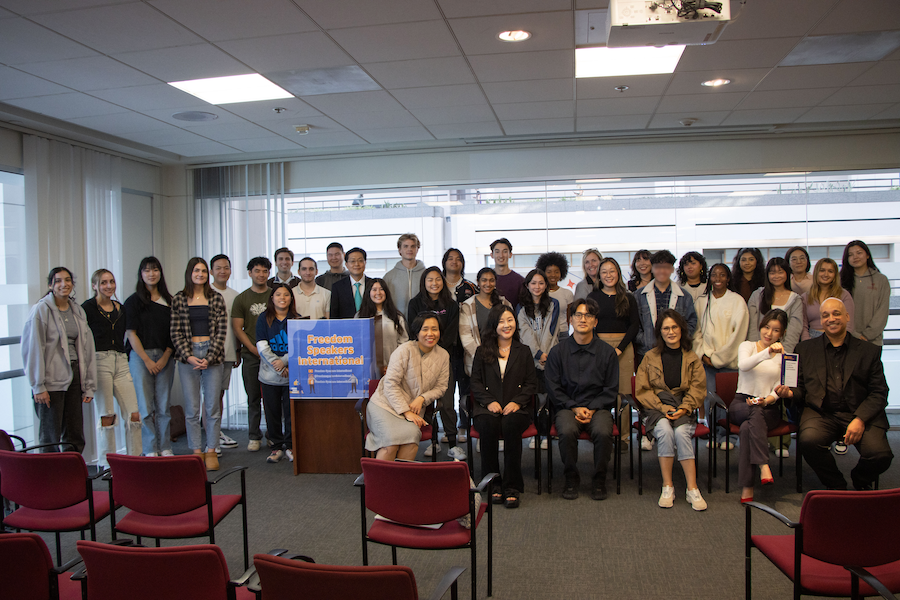
An energetic audience of students gathered in the McIntosh Center on Wednesday, Jan. 31, to learn about the lives of North Korean refugees. The panel discussion was organized by Heangjin Park, assistant professor of Asian and Asian American Studies in the LMU Bellarmine College of Liberal Arts, in collaboration with Freedom Speakers International (FSI), a South Korean non-governmental organization founded in 2013 by Casey Lartigue Jr. and Eunkoo Lee. FSI offers free English and public speaking classes to North Korean refugees so that they can support North Korean refugees’ settlement in South Korea while raising awareness of the human rights crisis in North Korea.
The event was a genuine cultural exchange and global experience without students having to leave the bluff. “Very few people have had the chance to go to North Korea and interact with North Koreans. We may know a lot about North Korea from our studies in political science, international relations, or Asia Pacific Studies, but our knowledge of North Korea has serious problems. We don’t know much about people in North Korea,” Professor Park said.
The afternoon began with students from Professor Park’s classes having the opportunity to speak freely and openly with the refugees in small groups. “Knowing is not a one-sided interaction. We can know other people better when they know us better. In the first part, our North Korean visitors spent some time asking our American students questions,” said Professor Park. “I hope the interaction in the first session helped us to know each other better.” The second session was a public talk where three North Korean refugees shared their stories of life in North Korea and life after defection.
The dialogue began by giving insight into North Koreans’ hardships, including government controls on one’s time and mind. The first speaker asked the audience: “Does it mean I am a traitor because I left the regime?” He also explained that many people leave North Korea due to human rights violations, for example, hunger and malnutrition caused by the regime’s mismanagement of the economy.
The second speaker shared her journey to South Korea and touched on the brainwashing that North Koreans are victims of. The North Korean government teaches their citizens that the U.S. and Japan are threats to their country, she said, and the government teaches North Koreans a distorted history. She was able to listen to foreign radio broadcasts from S. Korea and the U.S., where she learned about God and heard stories of North Korean refugees. Radio became a beam of hope for her family and was instrumental in breaking away from the government’s propaganda.
The last speaker shared his struggles of leaving his home country and moving to a new one. He explained that he didn’t expect any challenges before leaving North Korea, but once he moved, he learned otherwise. South Korea and North Korea have very different cultures, and he was struggling to get used to a more competitive society in South Korea.
During the Q&A, the audience asked the panelists about the cultural differences between North and South Korea, the various routes the refugees had taken to escape from North Korea, their reasons for leaving, and the repercussions if caught trying to defect. This talk highlighted the importance of closing the knowledge gap in understanding North Korea and its people. “Knowing North Korea is important, not because it plays an important role in geopolitics in Northeast Asia. Knowing North Korea is important since many North Koreans live in precarious conditions both in and beyond North Korea, and as fellow human beings, we need to find better ways to help them,” said Professor Park.



